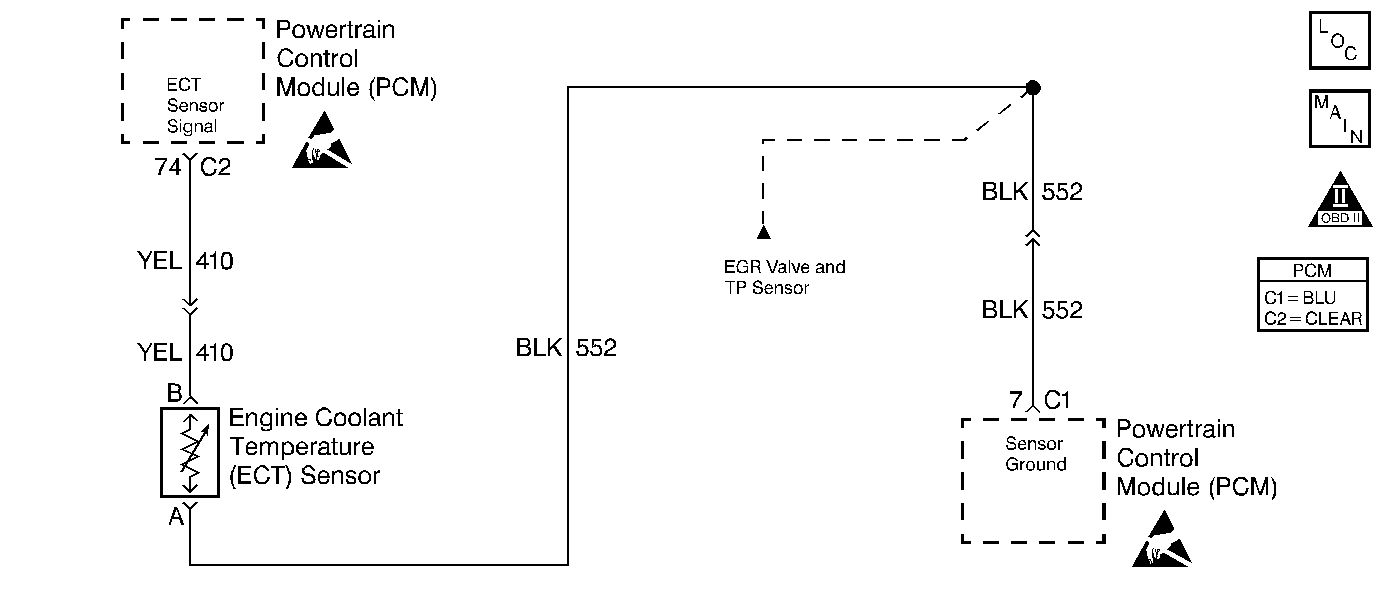
Circuit Description
This diagnostic test monitors the Engine Coolant Temperature sensor after a timer has reached 4.25 minutes. The PCM looks at the test conditions every second, and increments the timer each time the test conditions are met. After the timer has reached 4.25 minutes, if ECT is less than or drops below 5°C (41°F) for 3 seconds, DTC P0125 will be set. If ECT is greater than 5°C (41°F), the test will be considered passed regardless of the timer. The timer will be decremented if the PCM is disabling fuel to any cylinder during traction control maneuvers, acceleration reduction, torque management, etc. The timer will reset only when the engine stops running.
Conditions for Running the DTC
| • | DTCs 112,113,117 or 118 not set. |
| • | Engine running. |
| • | Intake air temperature 0°C (32°F) or more. |
| • | Vehicle speed at least 10 MPH. |
Conditions for Setting the DTC
At least 4.25 minutes have passed since test conditions were met and engine coolant temperature is less than 5°C (41°F) for 3 seconds.
Action Taken When the DTC Sets
| • | The PCM will illuminate the Malfunction Indicator Lamp (MIL) when the diagnostic runs and fails. |
| • | The PCM will record operating conditions at the time the diagnostic fails. This information will be stored in the Freeze Frame and Failure Records. |
Conditions for Clearing the MIL/DTC
| • | The PCM will turn the MIL OFF after three consecutive drive trips that the diagnostic runs and does not fail. |
| • | A Last Test Failed (current) DTC will clear when the diagnostic runs and does not fail. |
| • | A History DTC will clear after forty consecutive warm-up cycles with no failures of any emission related diagnostic test. |
| • | Use a scan tool to clear DTCs. |
| • | Interrupting PCM battery voltage may or may not clear DTCs. This practice is not recommended. Refer to Clearing Diagnostic Trouble Codes in Powertrain Control Module Description . |
Diagnostic Aids
If fault is not present inspect for an intermittent cooling system problem.
Test Description
The numbers below refer to the step numbers on the Diagnostic Table.
-
Checking DTC P0125 snapshot for the ECT sensor reading at the time the DTC set.
-
Checking for a faulty ECT sensor. If the reading is erratic, the sensor may be faulty.
-
Checking if vehicle can reach normal operating temperature.
-
Checking for a cause of high resistance that would cause a low sensor reading. If CKTs are okay problem must be vehicles ability to reach normal operating temperature (possible stuck open thermostat).
-
Checking for poor terminal contact at the ECT sensor.
Step | Action | Value(s) | Yes | No |
|---|---|---|---|---|
1 | Did you perform the Powertrain On-Board Diagnostic (OBD) System Check? | -- | Go to Step 2 | |
Was ECT lower than the value specified? | -37°C (-35°F) | Go to DTC P0117 Engine Coolant Temperature (ECT) Sensor Circuit Low Voltage | Go to Step 3 | |
Is ECT reading erratic or skipping (rapidly changing)? | -- | Go to Step 6 | Go to Step 4 | |
After engine has been run long enough to reach operating temperature (approx. 20 minutes) observe the ECT sensor display. Is coolant temperature less than the value specified? | 85°C (185°F) | Go to Step 5 | Fault not present. Refer to Diagnostic Aids | |
Was a repair made? | -- | Go to Powertrain Control Module Diagnosis for Verify Repair | Repair cooling system. Refer to Engine Cooling. | |
Was terminal contact repaired? | -- | Go to Powertrain Control Module Diagnosis for Verify Repair | Go to Step 7 | |
7 | Replace the ECT sensor. Refer to Engine Coolant Temperature Sensor Replacement . Is the replacement complete? | -- | Go to Powertrain Control Module Diagnosis for Verify Repair | -- |
